Indians are becoming aware of the harmful substances which are being used in the agricultural practices resulting in high productivity but causing serious health damage. And with the need of being healthy especially in the present times, Organic Farming is on a rise.
All because of the increasing health consciousness and the safety of the loved ones being a priority, organic farming in India is taking a positive shape. Whether it is fruits or vegetables, cereals or pulses or even dairy products, the new India needs everything which is completely organic.
You may feel Organic Farming is a relatively newer concept but you will be surprised to know that it is being practiced since ancient times.
The Green Revolution in the year 1960 changed the whole scenario in the field of agriculture where the farmers were introduced to high yielding seeds and fertilizers to maintain food security.
Increasing productivity ensured profit but ultimately the land was turning barren due to the excessive usage of fertilizers making the soil infertile and pesticides turning the product dangerous to consume.
Recommended Story – Top Organic Milk Brands Across India, Offering Doorstep Delivery
What exactly is Organic Farming?
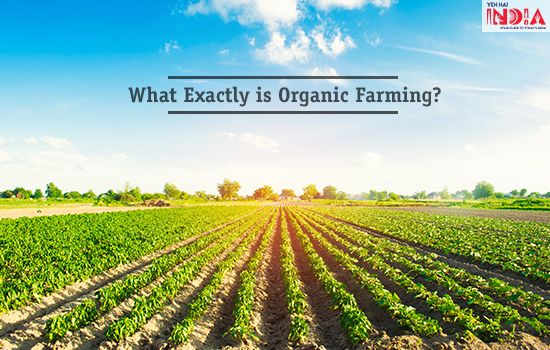
Introduced at the beginning of the 20th century due to the changing farming practices, Organic Farming is a method of producing crops and livestock without the use of pesticides, fertilizers, antibiotics and, growth hormones.
It believes in natural principles like composting for healthy food and biodiversity.
Organic Farmers use techniques such as crop rotation and use of composted animal and green manure which is used in traditional agricultural practices.
So, overall it is a healthy system that does not compromise with the health and at the same time does not harm the environment and is economically sustainable especially in today’s world.
Need for Organic Farming in India
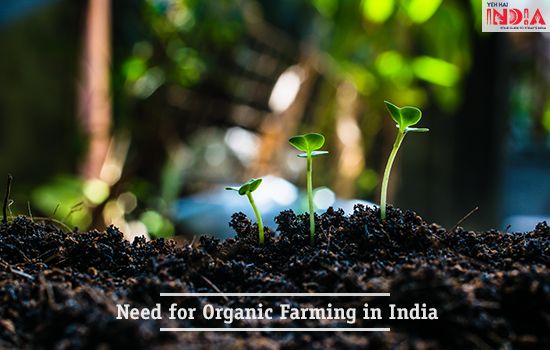
There are reasons for the need of the Organic Farming in India –
- The organic food industry is rising and is growing very fast ensuring high profitability
- Food security needs to be addressed with the growing population and decreasing supply of resources which is why there is a need to increase the production but in a feasible and sustainable manner
- Maintaining a clean and green environment is equally important, thus, environmental sustainability needs to be maintained which can be achieved through organic farming
- There needs to be an improvement in the health as the consumption can lead to many diseases such as cancer, infertility which happens when the toxic residue remains in the body thus, the safety of humans and animals are of utmost priority
- The strike of balance between the environment and the livelihood becomes immensely important due to the risks caused by conventional agriculture practices
Key Features of Organic Farming
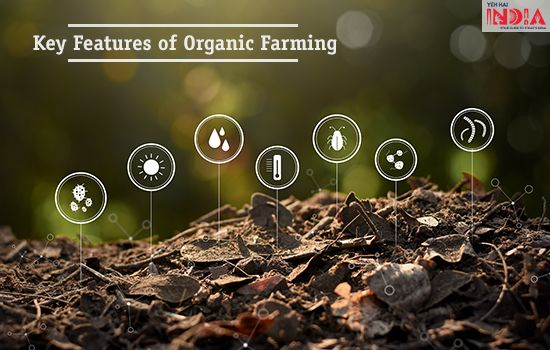
- Maintaining soil fertility and enhancing biological activities in the soil
- Livestock and poultry production through natural practices
- Crop production through natural practices
- Recycling of organic matter
- Providing nutrients through microbial action
- Managing diseases, pests and weed through the use of organic manuring, crop rotation, etc.
- Managing livestock effectively which includes taking care of the nutrients requirements, housing, breeding, etc
- Maintaining buffer zones and keeping records of the entire farm activities
Importance of Organic Farming
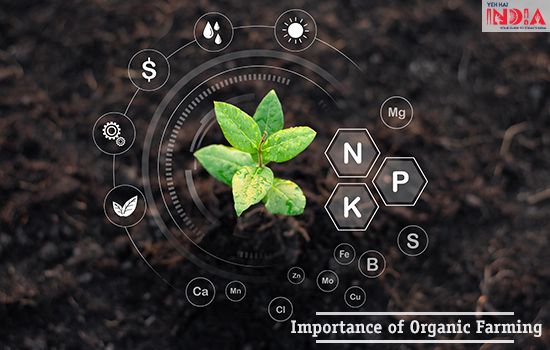
I may not have to stress on the various benefits we obtain through organic farming –
- It helps in reducing animal and human health hazards
- It helps in overcoming contamination of natural resources
- It helps in maintaining good soil health, structure and fertility
- It helps in removing all sorts of toxic chemicals from the environment
- It helps in maintaining low production costs
- It helps in keeping agricultural process at sustainable level
- It also makes the whole procedure economically sustainable
- It helps in meeting local production conditions and satisfy local markets
The emergence of Organic Agriculture in India –
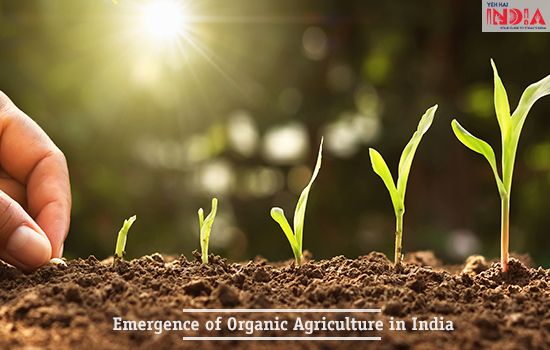
The farmers are quickly adapting organic agriculture and so with this we can divide them into three basic categories –
- The first category covers the farmers living in a no-input zone meaning that organic agriculture is their way of life which has been practiced since ages and is a traditional way of farming. (Not certified farmers)
- The second category covers the farmers who have adopted organic agriculture very recently after understanding the ill effects of conventional agriculture. (Both certified and not certified farmers)
- Third category covers the farmers who have systematically adopted organic agriculture for commercial purpose. (Certified Farmers)
Certification and Regulatory Body
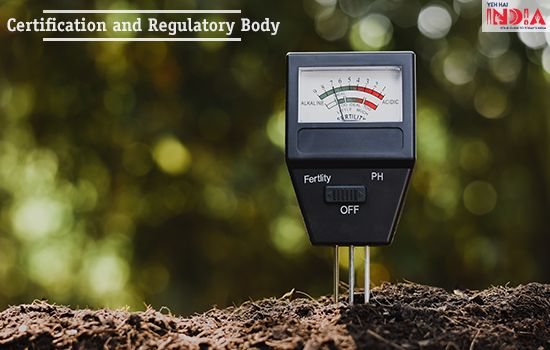
There is a regulatory body that ensures the quality –
- Under the Foreign Trade Development Regulation Act, NPOP looks after the requirements of the exports.
- National Program on Organic Production (NPOP) is the authority that defines the regulatory mechanism. They have two different bodies for regulation in the domestic market and the export market.
- Under Agriculture Produce Grading, Marking and Certification Act, it looks after the domestic market and imports.
- Agricultural and Processed Foods Export Development Authority (APEDA) is a regulatory body of NPOP as per FTDR Act.
NPOP notified under FTDR act is equivalent to USFDA, European Union and Sweden which means that the products can be exported to these countries without the need of any additional certificate.
For the certification processes there are 18 agencies accredited by National Accreditation Body out of which 4 are managed publicly and the remaining 14 are managed privately.
Starting your Organic Farm
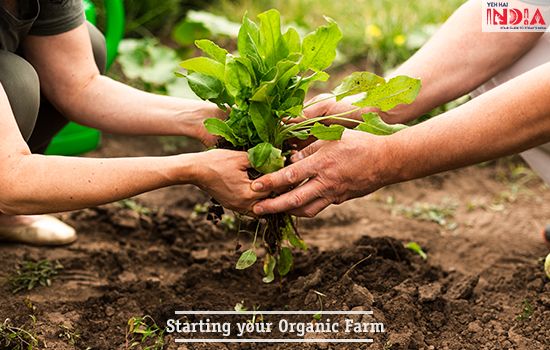
The Government of India is now encouraging and promoting Organic Farming and is introducing several schemes and subsidiaries to relax the burden of farmers which means favoring low investment farming.
IIT-Madras Prof Veezhinathan shares his own innovative zero-investment farming plan through which he is motivating the country to produce a chemical-free crop. The following is how you can start your organic farm – –
- The first and foremost thing you require island.
- Then you need organic manure which is made up of four main ingredients – cow dung, cow urine, goat dung and green manure.
- Thirdly, you need to put the green manure into the fields which is available at a cheap rate in the market. You definitely should allow goats to roam around for a few days as their excreta is a great source of manure.
- Then you go ahead with the seedling after which you can go ahead with transplantation.
- This is an important step where you need to work on water management which you can manage through solar panels. Using solar energy is beneficial here because it helps in removing unnecessary salts and harmful chemicals coming from the adjacent farms.
- You can even channelize the field with different pipes in to conserve water.
Organic Farming Management Practices
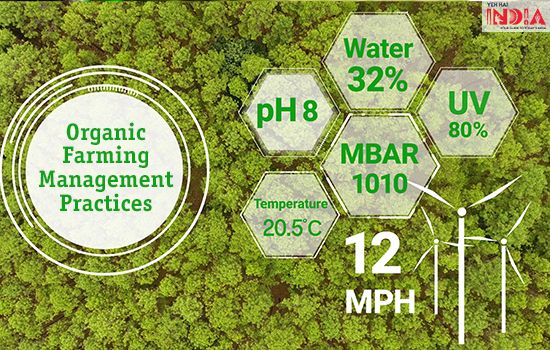
To certify a farm as an organic farm, there are some requirements to be fulfilled and some practices which need to be strictly followed –
- Cropping patterns needs to include crop rotation in order to avoid the the loss of fertility of the soil. Inter-cropping is also a healthy practice which helps in maintaining the health of the soil and helps in insect and disease management effectively.
- Mixed Farming is a healthy practice where you have integration of animal husbandry, sericulture, fishing farming, poultry management etc. This ensures healthy soil and good crop yield.
- The planting material should be ‘organic’ and in case it is not available then chemically untreated planting must be used. Other than that none other types of plants and seeds should be used.
- Manure requirements should be of utmost priority and should be of animal or plant origin. Crops and animal residues should be recycled and put in the soil directly or indirectly. This includes vermicompost, farm manure etc but no chemicals must be used.
- Use of fungicides, weedicides and pesticides are a strict no-no. For pest and disease management, anything to be used should be natural. Birds are natural enemies of insects. Weed should be removed through manual weeding and plant-based repellents can be used for avoiding any pests.
- Buffers and Barriers needs to be implemented under NOP when there is a risk of contamination via the flow of substances which are not allowed under organic regulations.
Profitability and Post Coronavirus Scenario

Organic Farming in India is very profitable –
- Firstly because of the reduction in the cost of farm inputs due to the usage of natural fertilizers.
- Secondly due to the increased demand and the value in the market.
- If the farm is taken care with required organic management practices and is certified from an authorized body, it will provide high chances of exporting the product.
Now with the pandemic hitting every business pretty hard, organic industry may stay unhurt especially in the post-pandemic scenario.
Industry observers have stated that there is a possibility of 20-25 percent growth in the organic market which gets only better with the time moving ahead.
The reasons for its stability or in fact the rise can be due to the following –
- As humans will now be adjusting to living with the virus, having a ‘strong immunity’ is the need of the hour which means people would be willing to prefer organic due to it being rich in antioxidants and nutrients which helps in boosting the immunity.
- The ecological balance may have taken a setback due to the usage of toxic chemicals in the form of fertilizers and pesticides, therefore, the ecology can be revived and stabilized through organic farming.
By following organic farming methods, sticking to the rules and regulations, acquiring the organic certification from the authorized body, and accessing the market at the right time by studying in-depth about it and the present market scenario, Organic Farming in India proves to be a profitable venture.
Also Read – Top Organic Food Brands available in your City


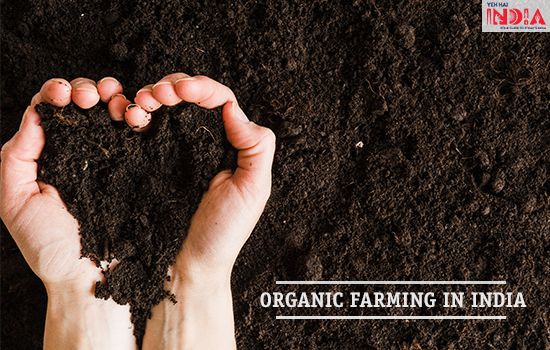








Useful content, keep it up Madam!